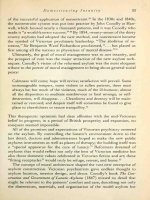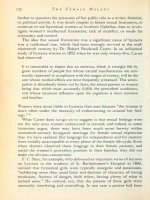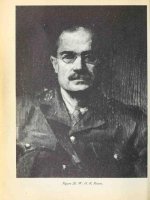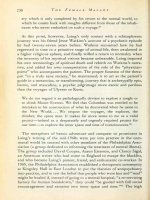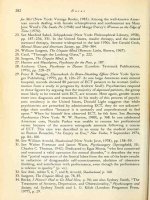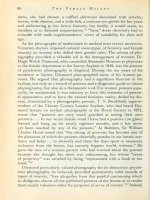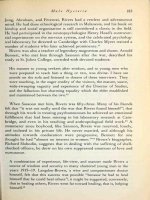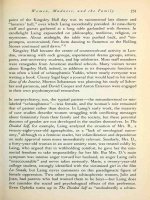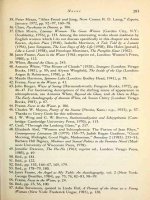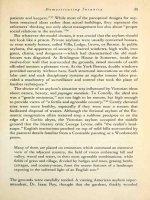The female malady women madness and engl 195
Bạn đang xem bản rút gọn của tài liệu. Xem và tải ngay bản đầy đủ của tài liệu tại đây (122.23 KB, 1 trang )
Hy
Male
s
t
eria
183
Jung, Abraham, and Ferenczi, Rivers had a restless and adventurous
mind.
He had done
kinship and
He had
ethnological research in Melanesia, and his
social organization
book on
considered a classic in the
is still
participated in the neuropsychologist
field.
Henry Head's controver-
experiments on the nervous system, and the celebrated psycholog-
sial
laboratory he directed at Cambridge with Charles Myers trained a
number of students who later achieved prominence. 41
Rivers was also a teacher of legendary magnetism and charm. Arnold
Bennett, who met him through Sassoon after the war, described his
study at St. Johns College, crowded with devoted students:
ical
men who
His manner to young seekers after wisdom, and to young
were prepared
astride
to teach
on the sofa and
were touching,
in the
him
a thing or two,
was
divine.
I
have
listened to dozens of these interviews.
eager crudity of the
visitors, the
sat
They
mature, suave,
wide-sweeping sagacity and experience of the Director of Studies,
and the fallacious but charming equality which the elder established
and maintained between the two. 42
When
Sassoon met him, Rivers was
fifty-three.
Many
of his friends
was not really until the war that Rivers found himself"; that
through his work in treating psychoneuroses he achieved an emotional
felt
that "it
fulfillment that
bridge,
had been missing
and even
in his
stammerer since boyhood,
and isolated
in his laboratory research at
teaching and anthropological
He
thought he had "almost no interest
women." 44
in
in dealing
shocked
own
he drew on his
Bennett
for
one
Rivers's biographer,
with the suffering of shell-
suppressed emotions of love and
nurturance.
A
combination of experience, life-view, and manner made Rivers a
source of
wisdom and
security to
many
shattered
young men
in the
years 1915-19. Langdon-Brown, a wise and compassionate doctor
himself,
felt
that this success
was possible "because he had
himself that he could heal others";
that in healing others, Rivers
himself. 45
A
never married, and although his
Richard Slobodin, suggests that
officers,
Cam-
work. 43
Sassoon, Rivers was reserved, lonely,
like
in his private life.
towards coeducation were progressive,
attitudes
field
went
it
to heal
might be suggested, conversely,
far
toward healing, that
is,
helping
